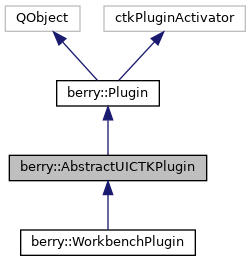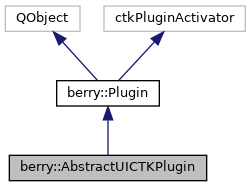#include <berryAbstractUICTKPlugin.h>


Public Member Functions | |
| AbstractUICTKPlugin () | |
| mitk::IPreferencesService * | GetPreferencesService () const |
| mitk::IPreferences * | GetPreferences () const |
| IWorkbench * | GetWorkbench () |
| void | start (ctkPluginContext *context) override |
| void | stop (ctkPluginContext *context) override |
 Public Member Functions inherited from berry::Plugin Public Member Functions inherited from berry::Plugin | |
| Plugin () | |
| void | start (ctkPluginContext *context) override |
| void | stop (ctkPluginContext *context) override |
| QSharedPointer< ctkPlugin > | GetPlugin () const |
| ILog * | GetLog () const |
| QString | GetStateLocation () const |
Static Public Member Functions | |
| static QIcon | ImageDescriptorFromPlugin (const QString &pluginId, const QString &imageFilePath) |
| static QIcon | GetMissingIcon () |
Additional Inherited Members | |
 Protected Attributes inherited from berry::Plugin Protected Attributes inherited from berry::Plugin | |
| ctkPluginContext * | m_Context |
Detailed Description
Abstract base class for plug-ins that integrate with the BlueBerry platform UI.
Subclasses obtain the following capabilities:
Dialogs
-
The dialog store is read the first time
getDialogSettingsis called. - The dialog store allows the plug-in to "record" important choices made by the user in a wizard or dialog, so that the next time the wizard/dialog is used the widgets can be defaulted to better values. A wizard could also use it to record the last 5 values a user entered into an editable combo - to show "recent values".
-
The dialog store is found in the file whose name is given by the constant
FN_DIALOG_STORE. A dialog store file is first looked for in the plug-in's read/write state area; if not found there, the plug-in's install directory is checked. This allows a plug-in to ship with a read-only copy of a dialog store file containing initial values for certain settings. -
Plug-in code can call
saveDialogSettingsto cause settings to be saved in the plug-in's read/write state area. A plug-in may opt to do this each time a wizard or dialog is closed to ensure the latest information is always safe on disk. - Dialog settings are also saved automatically on plug-in shutdown.
For easy access to your plug-in object, use the singleton pattern. Declare a static variable in your plug-in class for the singleton. Store the first (and only) instance of the plug-in class in the singleton when it is created. Then access the singleton when needed through a static getDefault method.
See the description on Plugin.
Definition at line 72 of file berryAbstractUICTKPlugin.h.
Constructor & Destructor Documentation
◆ AbstractUICTKPlugin()
| berry::AbstractUICTKPlugin::AbstractUICTKPlugin | ( | ) |
Creates an abstract UI plug-in runtime object.
Plug-in runtime classes are ctkPluginActivators and so must have an default constructor. This method is called by the runtime when the associated bundle is being activated.
Member Function Documentation
◆ GetMissingIcon()
|
static |
◆ GetPreferences()
| mitk::IPreferences* berry::AbstractUICTKPlugin::GetPreferences | ( | ) | const |
◆ GetPreferencesService()
| mitk::IPreferencesService* berry::AbstractUICTKPlugin::GetPreferencesService | ( | ) | const |
Returns the preferences service for this UI plug-in. This preferences service is used to hold persistent settings for this plug-in in the context of a workbench. Some of these settings will be user controlled, whereas others may be internal setting that are never exposed to the user.
- Returns
- the preferences service
◆ GetWorkbench()
| IWorkbench* berry::AbstractUICTKPlugin::GetWorkbench | ( | ) |
Returns the Platform UI workbench.
This method exists as a convenience for plugin implementors. The workbench can also be accessed by invoking PlatformUI.getWorkbench().
- Returns
- IWorkbench the workbench for this plug-in
◆ ImageDescriptorFromPlugin()
|
static |
Creates and returns a new image descriptor for an image file located within the specified plug-in.
This is a convenience method that simply locates the image file in within the plug-in (no image registries are involved). The path is relative to the root of the plug-in, and takes into account files coming from plug-in fragments. The path may include $arg$ elements. However, the path must not have a leading "." or path separator. Clients should use a path like "icons/mysample.gif" rather than "./icons/mysample.gif" or "/icons/mysample.gif".
- Parameters
-
pluginId the id of the plug-in containing the image file; nullis returned if the plug-in does not existimageFilePath the relative path of the image file, relative to the root of the plug-in; the path must be legal
- Returns
- an image descriptor, or
nullif no image could be found
◆ start()
|
override |
The AbstractUIPlugin implementation of this Plugin method refreshes the plug-in actions. Subclasses may extend this method, but must send super first.
- Parameters
-
context
◆ stop()
|
override |
The AbstractUIPlugin implementation of this Plugin method saves this plug-in's preference and dialog stores and shuts down its image registry (if they are in use). Subclasses may extend this method, but must send super last. A try-finally statement should be used where necessary to ensure that super.shutdown() is always done.
The documentation for this class was generated from the following file:
